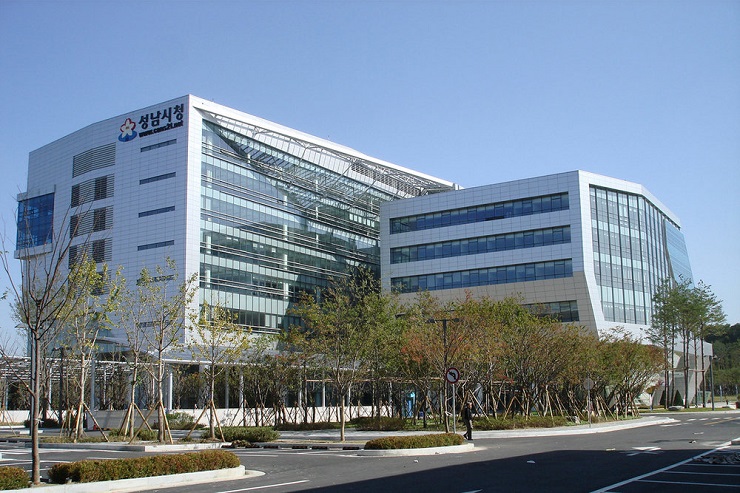On June 1, 2022, in addition to the local government elections, there will be a by-election for parliament: when an MP leaves to join the government, his or her seat is vacated and must be filled. Although the mandates are few and will not change the overall balance of power (recall that the opposition to President-elect Yoon Suk-yeol controls 172 of the 300 mandates), two political heavyweights have entered the fray.
The first is the former head of Yoon’s transition team and presidential candidate Ahn Cheol-soo. His People Party has been swallowed up by the Conservatives and he is thought to be aiming for the Conservative leadership seat, for which a parliamentary mandate is desirable.
On May 6, Ahn Cheol-soo announced his candidacy for the parliamentary by-election in Bundang-A district, a seat previously held by former Yoon spokesperson Kim Eun-hye, who, in turn, is now running for governor of Gyeonggi-do province. The district is significant because it includes the city of Seongnam, whose mayor was former Gyeonggi-do ex-governor Lee Jae-myung, who lost the election to Yoon Seok-yeol. Answering a question about the connection with the constituency, Ahn, who founded the anti-virus software firm AhnLab, said his company was one of the first to build an office building in the region.
Ahn’s Democratic rival is former MP Kim Byung-gwan, and among other rivals is the same lawyer who wrote the “Goodbye, Lee Jae-myung” book.
But Lee Jae-myung is also returning to politics, which is rather unusual. The loser of the earlier presidential race has kept a low profile for some time.
Equally interesting is that Lee Jae-myung is not running in his home province, but in the Gyeyang-gu district within Incheon City. The seat in this district has been vacant since former DPK chairman Song Young-gil resigned to run for mayor of Seoul.
Moreover, a senior Democratic Party spokesman, Ko Yong-jin, has said that Lee will not only run in the by-election but will also lead the DPK’s campaign in the local elections. Lee served as mayor of Seongnam before he was elected governor of Gyeonggi-do province. But he has no experience of working in a national parliament. If he is elected and becomes a legislator, it may be relatively easier for him to consolidate his support base in the next presidential election.
Reaction to Lee’s early return has been mixed. Park Ji-hyun, co-chair of the interim committee of the Democratic Party, has advocated Lee’s return to politics. However, some members of the Democratic Party felt that since he was responsible for his defeat in the presidential election, it was inappropriate for him to return to politics so quickly. As the conservative media noted, “it is rare for an unsuccessful presidential candidate to run in a parliamentary or local election shortly after his or her defeat”; usually a “period of self-reflection”, when one stays out of politics and ponders the reasons for failure, lasts more than a year. But does this mean that the party has run out of political heavyweights?
Furthermore, Lee Jae-myung continues to have “Seongnam Gate” hanging over him as, it seems, a whole set of potential criminal cases. Apart from the corruption scandal related to the Taejang-dong apartment building project, there are others, such as the story that while in office as governor, Lee allowed his wife to use Gyeonggi-do provincial government corporate credit cards for private purchases. Conservatives see this as a detriment to the national treasury.
On May 2, police raided Seongnam City Hall in connection with allegations that while serving as mayor of the city, Lee Jae-myung received large donations from companies through the city’s football club. Searches and seizures took place at five city government offices, including the city’s planning and policy planning department. As part of the case, Lee is accused of receiving about 16 billion won (US$12.6 million) in corporate donations from various companies, including Doosan and Naver, during 2014-2016. The mayor’s office is believed to have received money in the form of sponsorship for a local football club, in return for issuing building permits for various commercial and industrial projects.
And on May 11, a group of 33 former Taejang-dong residents filed a criminal complaint, accusing the former mayor of giving unfair profit to a developer and abusing the municipality’s compulsory land purchase order to buy their land against their will.
The Conservatives therefore blatantly claim that Lee’s “shameless” bid for a parliamentary seat is designed to grant him immunity from arrest. Under Article 44 of the ROK Constitution, MPs cannot be arrested during a parliamentary sitting without parliamentary consent unless they are caught red-handed. That is why the seat Lee is running from is not Seongnam, where he lives, but Incheon, with which he has no connection, but in this district the Democrats are strong and their candidate will win, whoever he is. Song Young-gil has run for five consecutive terms from there, and the Conservative candidate is not a particularly significant figure.
As for the local elections, which the author will continue to follow, Democrat Kim Dong-yeon and conservative Kim Eun-hye go head-to-head in the most frenetic confrontation between the two Kims.
In Seoul, the incumbent conservative mayor, Oh Se-hoon, has a clear lead, with more than 20 percentage points over his Democratic Party rival Son Young-gil.
All in all, the new season of the series “South Korean domestic politics” is promising to be interesting.
Konstantin Asmolov, PhD in History, leading research fellow at the Center for Korean Studies of the Institute of the Far East at the Russian Academy of Sciences, exclusively for the online magazine “New Eastern Outlook”.

